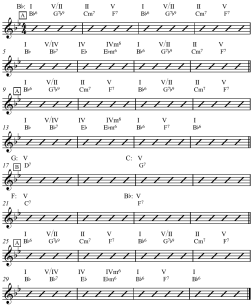August 22, 2016
What is music? And what can music tell us about the reader’s role in co-creating the Bible’s meaning?
 I took up classical guitar a few years ago. I had musical experience before I did so, but I never thought about music philosophically. But once I started playing guitar and, more important, performing, I did begin to reflect more philosophically about music.
I took up classical guitar a few years ago. I had musical experience before I did so, but I never thought about music philosophically. But once I started playing guitar and, more important, performing, I did begin to reflect more philosophically about music.
I had always assumed that, in the primary sense, music is what the composer wrote–the score. Once I began to perform and saw the interpretive decisions that go into a performance, I realized that the score is not music, at least not in its fullest sense. The score is potentially music, but it requires performance to make it actual music.
The notes on a page are thus not the music. They are instructions for creating music.
Sometimes the instructions are pretty general; at other times they are specific. In classical guitar music, the further back you go (Renaissance, Baroque), the less the composer indicated how the music should be played. The nearer you get to the present, the more composers tend to indicate in the score how they want the music to be played.
But every performance involves interpretation. The score may indicate a tempo of lento or allegro, but those words really indicate ranges; individual measures will be played faster or slower according to how the performer feels the music ought to go. The score may tell you to play a section quietly or loudly, but it’s really all relative. The performer finally has the responsibility of determining what he or she thinks the piece is about–what are its dramatic qualities, the interplay of dynamics, of tension and resolution.


That is why jazz tells us so much about music. Jazz is about improvisation. Within the parameters of the piece’s harmonic structure (the chords), the performer treats the score as a script that can be interpreted in an infinite number of ways. (See the lead sheet above, which omits the melody and reduces the song to its chords.) And even the harmonic structure can be altered via substitution of one chord for another. Of course, improvisation and chord substitution are subject to the laws of music, but these are pretty flexible laws, giving the performer great latitude.
So, what has this got to do with reading the Bible?
- Perhaps we can think of the Bible as being like a musical score–it contains potential meaning, but it requires reading/hearing in order to become actual meaning. Reading actualizes the Bible as a meaningful text just as performance actualizes a musical score and creates music.
- If so, then reading the Bible is a performance, a creative act.
- As a creative act, reading does not come about ex nihilo (from nothing). It comes from the score and the interpretation of the score. But it’s not just the score in a different form.
- Just as there is variation in performance, so there is variation in reading, in interpretations of the Bible.
- Just as there are good and bad performances of music, authentic and inauthentic interpretations of music, so there are parameters for biblical interpretation. Some interpretations are compelling, others are absurd. Just as there are parameters even in Jazz and thus limits to improvisation, so there are limits to biblical interpretation.
Photo attribution:
- Joe Pass: http://flickr.com/photos/11447043@N00/424827915. This file is licensed under the Creative Commons Attribution-Share Alike 2.0 Generic license.
- Barney Kessel: http://flickr.com/photos/51807909@N00/243580666. This file is licensed under the Creative Commons Attribution-Share Alike 2.0 Generic license.
- Jazz score: https://en.wikipedia.org/wiki/Rhythm_changes#/media/File:Rhythm_changes_complete_in_B-flat_Spitzer.png. This file is licensed under the Creative Commons Attribution-Share Alike 3.0 Unported license.
I think you’re right about this. I think the same can be said about the “book of nature” and human making as well – humans can actually form space-time in certain ways in the way that a musician forms or improvises a score. I’ve used a similar image of poem and reader in which a reader must form a rhythm in response to what’s on the page.
LikeLike
Thanks for the response. Not sure what you meant about “the book of nature.” You have an interesting looking website–I’ll explore it further.
LikeLike
Thanks! Sorry, I just meant creation or the natural world. The book of nature is an idea from the Middle Ages that nature can be read in similar ways to scripture, as a source of revelation. I was attempting to connect the way that we read scripture with the way that we understand the natural world as both involving interpretation/construction/improvisation.
LikeLike